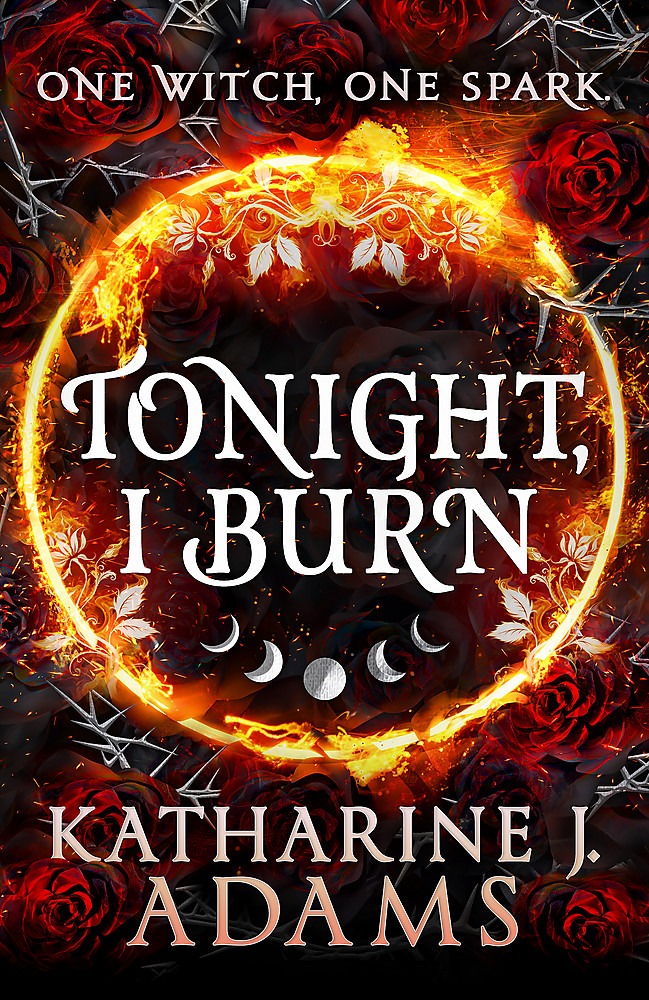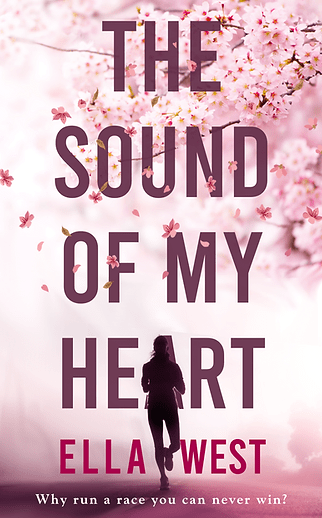Two YA novels with heavy themes are deftly reviewed by Venice White. Tonight, I Burn is a twist on witch culture and The Sound of My Heart deals with a suicide (reader discretion is advised; mental health resources are listed at the bottom of the page).

Tonight, I Burn, by Katharine J. Adams
Welcome to Halstett, where witches are burned at the stake every night. Penny Albright is a young thorn witch living with her coven in the Colligerate compound. Under the control of the High Warden, Penny and all the other witches are forced to use their powers exclusively to service him and his Gilded army. Out of five covens, thorn witches have the most significant power, but it comes with a price. Once they turn twenty-one, each member of the coven is put on rotation to be burned at the stake, in order to walk into Death. Penny is the kind, bold, red-headed protagonist, third in line to the Thorn Crown, and her story begins a few days before she has to burn for the first time.
It was a genius move, twisting the history of burning women at the stake from a punishment, into a means of entering Death, which is the only place their power can truly be used.
Popular culture reveals our morbid fascination with the burning of witches. Tonight, I Burn made me question why burning at the stake was chosen both historically as a method of execution, and then by the author, Katharine J Adams, as a process that thorn witches voluntarily participate in. Fire ensures the complete destruction of any physical body so nothing of the witch would be left behind. This would have been necessary hundreds of years ago so there was no chance of witches bringing themselves back to life—although in this novel, they are capable of doing exactly that, as long as they follow all the rules. Adams also offers a very different idea of the afterlife. Once a thorn witch has crossed the Veil into Death—a quietly active, empty landscape—she uses her power to repair any damage done to the Veil, and guide any unwilling souls who have recently passed away towards the mysterious Horizon, all without drawing attention to herself. It was a genius move, twisting the history of burning women at the stake from a punishment, into a means of entering Death, which is the only place their power can truly be used.
This novel not only challenges the stereotype of witches, but also presents a different example of relationships than I have come to expect from YA novels. Adams has commented that growing up she believed everyone secretly felt attraction towards all other genders. This is explored through Penny’s attraction to and subsequent relationship with both a young man and a young woman. It was impressive that this was handled in a way that did not suggest Penny was being unfaithful to either party, but instead felt like a natural development of feelings she hadn’t been allowed to previously explore—and demonstrated that relationships look different for everyone. Penny’s initial doubts towards her own feelings didn’t seem to stem from a confusion towards her sexuality, but rather how she was supposed to navigate forming relationships with people in an otherwise solitary environment. Her capacity for love is as much of an act of rebellion under the Warden’s dictatorship as any underground resistance, and the time she spent in both Life and Death was an intriguing metaphor for the duality of her romantic interests.
This novel not only challenges the stereotype of witches, but also presents a different example of relationships than I have come to expect from YA novels.
The novel opens with a brief history of the first witch queens, the first line beginning with ‘On a dark and stormy night…’ which I found quite hilarious given how many times I have been advised not to use cliches such as this. There was a lot of information to absorb initially, which is expected when learning the history and logic of a new world. Yet there was often repetitive imagery used in quite close proximity along with an abundance of adjectives. This made the descriptions quite dense and reminded me I was reading a story rather than getting to be fully immersed in Penny’s mind. However, the novel’s pace really picked up a few chapters in and I very quickly grew attached to the characters. Their decisions and actions were more successful at explaining what kind of world I was entering, and it was the dream scenario having a protagonist who is also an avid reader.
In the end, I was so absorbed in this book that I realised too late that there was still so much action to take place and not enough pages left for it to play out, and so I was unbelievably annoyed for not pacing myself better. Luckily for me, and all of you who get to read this book for the first time, the ending was beautifully set up for a sequel, for which I am already impatiently waiting for. Witchcraft was a metaphor for evil in many Disney movies so I find it infinitely amusing that there’s a generation of young people growing up now aspiring to be witches instead of princesses—and fair enough, this way you get to fall in love and get superpowers.

The Sound of My Heart, by Ella West
*Trigger warning: this novel opens with a suicide and it is frequently referred back to throughout the book. Readers should take care especially if this topic is personally distressing.
Emily Evans has the traumatic experience of witnessing the immediate before and after of a stranger’s suicide, while training to compete in her next half marathon. Going for regular runs means Emily knows who else is up and about as early as she is. So when she encounters an elderly man attempting to secure a rope up a tree one morning, it is both out of generosity and concern that she stops to offer a hand. However, as the man just laughs at her and explains he is trying to collect walnuts, Emily leaves him to it. On her way back, she sees ambulances surrounding the same man who is now hanging from the tree.
It is difficult enough to process death in of itself, let alone when it is unexpected. The man is never named and aside from learning some details about his family, Emily does not hear any further mention of what happened to him. She struggles to accept why his death can’t be talked about, because of the rules around how suicide is reported. But her attention is soon diverted to a different kind of incident. Her neighbour, Mr Harris, has a stroke and Emily’s dad volunteers her to help look after him.
The narrative came through the single lens of Emily’s perspective. Her voice was entertaining and observant, although I would have enjoyed other characters’ perspectives, or an omniscient point of view, to flesh out what was otherwise a very literal narrative. But I appreciate this may have been intentional, because reading this book felt like a conversation with a (fast-talking) friend. There are only brief snippets of Emily’s school life, where her best friend Sophie is either bragging about her netball team (until they start losing) or obsessing over her new boyfriend, Steve. It felt as though Sophie’s character was more of a tool to contrast with Emily, her infrequent appearances serving as background noise to Emily’s busy inner world. Emily was willing to forgo a party invitation from Sophie—claiming it would interfere with her race prep—but chose to spend an hour most days encouraging an elderly man to have proper conversations with her and spend more time outside. I found it almost refreshing—if a little bizarre—to spend time in the mind of a young person who wasn’t bothered with social dynamics, instead focused on her own and others’ well-being. Although Emily does not explicitly say so, perhaps her efforts to make Mr Harris’ life better were a subconscious attempt to relieve her guilt over the conversation with the man by the tree and prove she is capable of making a difference. I say this out of empathy, because Emily was not at fault.
The emphasis on the natural world and its changeability offers a metaphor to what Emily is coming to understand; we cannot always control what might happen to ourselves, let alone what other people might choose to do
The novel is based in Cromwell and includes a lot of detail about the landscape and the seasons. The emphasis on the natural world and its changeability offers a metaphor to what Emily is coming to understand; we cannot always control what might happen to ourselves, let alone what other people might choose to do. Alone on her run at the start of the book, all Emily can hear is ‘the sound of [her] heart beating, [her] breath flowing in and out’ before seeing the man beneath the tree – life and death existing side by side. Emily did not share what she witnessed with Sophie, and struggled to talk about it even with her parents. It made me deeply sad that there was nowhere for her complicated feelings to go, and no one who could truly help her, if not to understand what she saw, at least to hear her out. She even begins to wonder whether Mr Harris might have preferred not to have survived the stroke, given how challenging his life has become, which is a complicated line of thought for a young girl with her whole life ahead of her. It is a relief, then, to read about the pure joy Emily and her family experience as they watch her little sister doing cute baby things like learning to walk for the first time, an event that is especially poignant given that Emily has been helping Mr Harris regain his own ability to walk.
While this novel deals with an incredibly sensitive subject, I believe it is important to have books that reflect both the positive and the difficult parts of life, especially from the point of view of a young person.
The Sound of My Heart is the latest release from Ella West, who has previously written five YA novels. Despite the pretty cover, this novel dealt with heavy topics and I would recommend some readers proceed carefully. There are many restrictions around publicly reporting on suicide, but the author mentions in the dedication that she believes if we talk about it more, there will be fewer attempts. While this novel deals with an incredibly sensitive subject, I believe it is important to have books that reflect both the positive and the difficult parts of life, especially from the point of view of a young person. The events in the book led Emily to reconsider everything she thought she knew about herself. She claims to compete ‘in a sport that [she] can never, ever do well in’, because women never win marathons; emphasised by the facts in between each chapter about marathons that have taken place all over the world and the men who won them. But like any good protagonist in a coming-of-age story, Emily learns something new—there are better reasons to work hard for something than simply wanting to win.

The Sound of My Heart (eBook)
By Ella West
Published by Rutherford Road Press
RRP: $4.76 (Kindle)
Mental health resources (courtesy of the Mental Health Foundation)
https://mhaw.nz/—Mental Health Awareness Week website
Free call or text 1737 any time for support from a trained counsellor
Lifeline – 0800 543 354 (0800 LIFELINE) or free text 4357 (HELP)
Youthline – 0800 376 633, free text 234 or email talk@youthline.co.nz or online chat
Samaritans – 0800 726 666
Suicide Crisis Helpline – 0508 828 865 (0508 TAUTOKO)
Healthline – 0800 611 116
A comprehensive list of available helplines can be found at https://mentalhealth.org.nz/helplines.

Venice White
Venice White used to get in trouble for reading too much instead of doing her homework, so it’s really the dream scenario for her to be sent books and then get to write about them. She is based in Tāmaki Makaurau and loves all things book-related, writing, art and crochet. Venice has worked in two bookshops and studied publishing – both of which have increased the variety of books and amount she has read, but she still especially loves curling up with a YA novel and a cup of English Breakfast tea.



